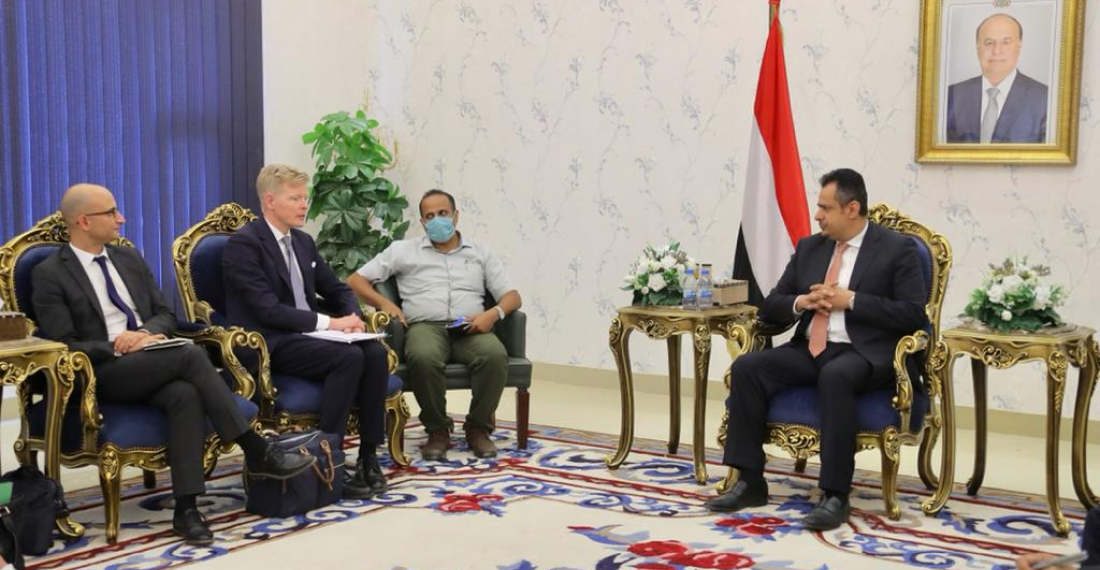A delegation of European Ambassadors arrived in Aden, Yemen on Saturday (6 February) for meetings with the leadership of Yemen's legitimate government and to support a comprehensive and sustainable peace for the country. The delegation, led by Hans Grundberg, EU Ambassador to Yemen, met Prime Minister Maeen Abdul Malik Saeed and Foreign Minister Ahmed Bin Mubarak.
The European delegation included the ambassadors of France, Germany, the Netherlands, Belgium, Sweden, Ireland and Finland, as well as the deputy ambassador of Norway. Duiring the discussions the two sides expressed willingness to work for a comprehensive and sustainable solution to end the ongoing conflict.
The EU delegation is the highest-ranking group of foreign envoys to visit Aden since the new Yemeni government was installed there recently.
In a statement, Yemeni foreign minister, Ahmed Bin Mubarak described the delegation visit as an “important political message” of support to the Yemeni government. Among the issues discussed was the Riyadh agreement, repairing the Safer tanker, the government’s efforts to restore services in the liberated provinces and the government willingness to reach a “real, comprehensive and lasting” peace in Yemen.
European ambassadors to Yemen confirmed that their visit to Aden comes as a political message to express confidence in the new government and support its goals. The delegation reiterated its condemnation of the recent attack that targeted Aden International Airport. The delegation also affirmed that the EU is a strong partner with Yemen, and will work hand in hand with the government on important aspects such as stability, humanitarian support and development cooperation within the framework of the international community.
Yemeni officials also highlighted that the Houthi rebels, who control large swaths of the north of the country, were raising obstacles during the recent prisoner swap talks in Amman. Representatives of the Yemeni government and the Houthis last month resumed UN-backed prisoner exchange talks with the aim of releasing 301 prisoners on both sides. The Yemeni government and the Houthis had previously exchanged prisoners as part of UN-mediated efforts.
The Yemeni government described the Houthi actions as uncompromising and sought to obstruct the talks. It is believed that the Houthis are unwilling to release some of their harsh critics amongst the ranks of journalists.
In a recent social media campaign, a group of Yemeni activists called for an end of Houthi crimes in Yemen. Yemeni activists also expressed opposition to any peace deal with the Houthis that does not punish them for human right abuses.
The United States had recently revoked the designation of Houthis as a terror organisation, a move that garnered varied responses. It has meanwhile, expressed its support for the peace process and to end the war and for defending Saudi Arabia whilst ending the supporting for Arab military coalition.
It is not clear yet if the EU will work with the United States or the UN to support the peace process. Last week, the US announced the appointment of a Special Envoy to Yemen. Moreover, the UN special envoy, Martin Griffiths, began a two day trip to Iran on Sunday, where he will meet the senior officials to discuss the ongoing conflict. According to the UN, Griffiths’ priorities during the meetings will focus on reaching a ceasefire in all parts of Yemen, enforcing urgent humanitarian measures and the resumption of the political process.
Source: commonspace.eu with Arab News (Riyadh) and other agencies.
Picture: Yemeni Prime Minister, Maeen Saeed receives a delegation of 9 EU ambassadors to Yemen who arrived to the interim Capital Aden (Twitter: @Yemen_PM).







